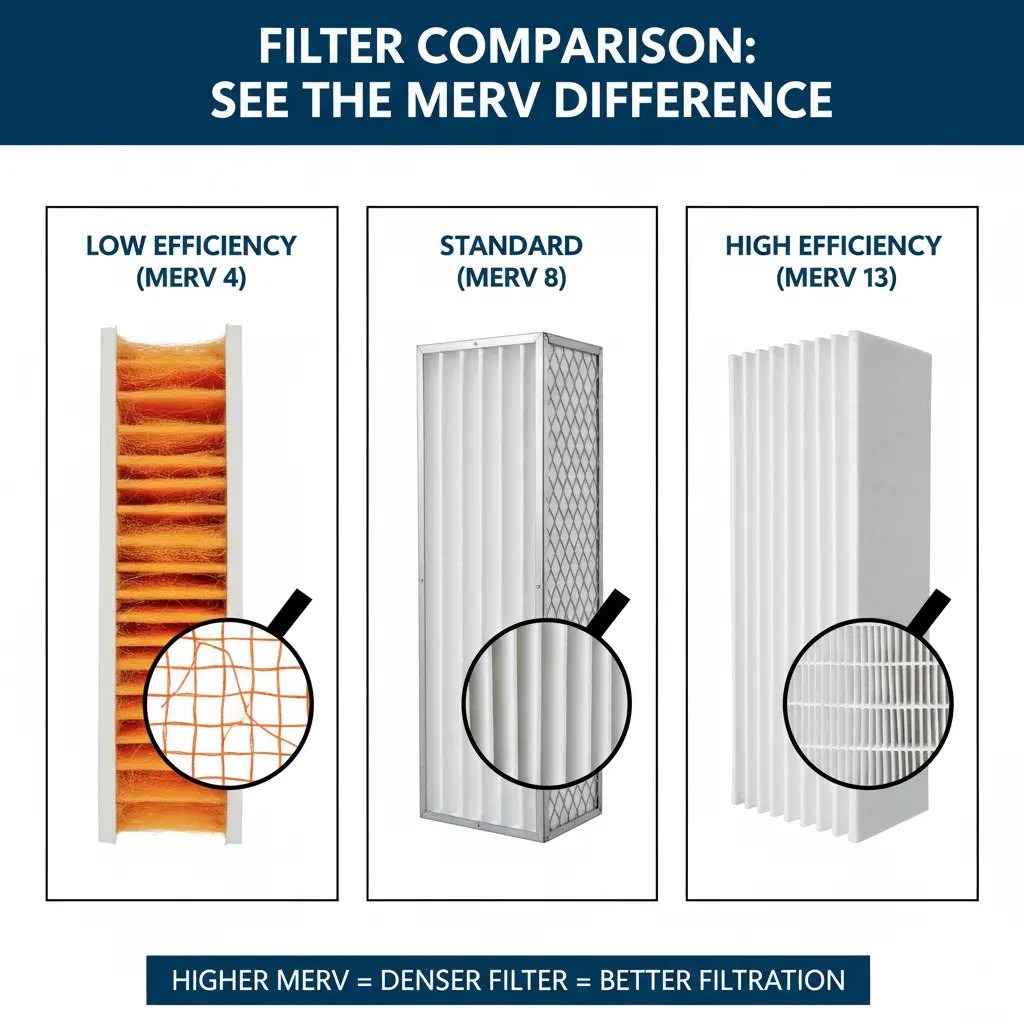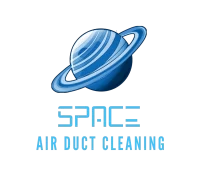Living in the Dallas-Fort Worth area means dealing with more than just heat; it means contending with dust, pollen, and everything else the North Texas wind carries into your home. If you constantly feel like you’re dusting every surface just to have a new layer reappear a day later, your home is “dusty,” and the first line of defense is your HVAC air filter.
Choosing the right filter for a dusty house is a critical balance between maximum air purification and maintaining the health of your heating and cooling system. A filter that’s too weak does nothing to solve your dust problem, but one that’s too strong can cause severe damage to your expensive HVAC equipment.
At Space Air Duct Cleaning, we see firsthand how the wrong filter choice can lead to reduced efficiency and costly repairs. Here is your definitive guide to selecting the best HVAC filter to win the battle against dust in your Dallas home.
Understanding the MERV Rating: Your Filter’s Report Card
The most important factor in choosing an HVAC filter is its MERV rating, which stands for Minimum Efficiency Reporting Value. This rating, ranging from 1 to 20, tells you exactly how effective the filter is at capturing airborne particles of various sizes.

Simply put, the higher the MERV rating, the more dust and tiny particles the filter removes from the air circulating through your home.
| MERV Rating Range | What It Filters Out | Typical Application |
| MERV 1–4 | Large particles, carpet fibers, visible lint. | Standard disposable fiberglass filters; provides minimal protection for human health. |
| MERV 5–8 | Mold spores, common dust, pollen, dust mites. | Most basic residential homes; good balance of cost and filtration. |
| MERV 9–12 | Fine dust, pet dander, lead dust, welding fumes. | Better residential filtration; recommended for homes with allergy sufferers. |
| MERV 13–16 | Bacteria, smoke, sneeze nuclei, virus carriers. | Superior filtration; often used in hospitals and commercial buildings. |
The Best Filter for a Dusty House: MERV 8 to MERV 11
For the average dusty Dallas home, the best range for superior filtration without jeopardizing your system is MERV 8 to MERV 11.
The MERV 8 Sweet Spot: Great Protection, Minimal Restriction
A MERV 8 pleated filter is often the ideal starting point for a dusty house. These filters are highly effective at trapping the particles that make up visible household dust:
- Pollen and Mold Spores: Essential for DFW’s high-allergy seasons.
- Pet Dander and Hair: The main culprit in many dusty homes.
- Common Household Dust: Captures particles in the 3.0 to 10.0-micron range with high efficiency.
A MERV 8 filter offers a significant upgrade over cheap fiberglass filters while creating minimal static pressure (airflow resistance), which is safer for most standard residential HVAC units.
The MERV 11 Upgrade: For Allergy Sufferers
If your dusty home also contains family members with allergies, mild asthma, or shedding pets, upgrading to a MERV 11 filter provides even cleaner air. These filters begin to capture smaller particles (down to the 1.0-micron range) with much higher efficiency, making a noticeable difference in indoor air quality.
Why You Can’t Just Pick the Highest MERV Rating
It might seem logical that a MERV 13 or MERV 16 filter is the ultimate solution for dust, but this can be a costly mistake for many homeowners. A filter’s efficiency comes at the price of airflow restriction.
A filter’s tightly woven media acts like a dense screen. While it catches microscopic particles, it simultaneously makes it much harder for your HVAC system’s blower motor to pull or push air through. This leads to a rise in Total External Static Pressure (TESP).
When the TESP becomes too high, it creates a cascade of damage that far outweighs the benefit of extra-clean air:
- Blower Motor Strain: The motor has to work harder and longer to move the required volume of air (CFM), leading to overheating and premature failure of the most expensive component of your system.
- Reduced Cooling and Heating: Restricted airflow means conditioned air doesn’t reach all rooms efficiently, leading to poor cooling in the Dallas summer and forcing the unit to run constantly, resulting in high energy bills.
- Coil Damage: Insufficient airflow across the indoor coil can cause the coil to freeze up in the summer, which can lead to compressor failure.
Crucial Rule: Never install a MERV filter higher than the rating specified by your HVAC equipment manufacturer unless a professional technician confirms your system’s ductwork can handle the increased static pressure.
The Ultimate Dust Defense: Filter PLUS Duct Cleaning
While the right filter is essential, it’s merely a defensive measure. If your home has been dusty for years, the source of your problem is not just the incoming air; it’s the contamination already trapped inside your HVAC system.
Your ductwork and internal components are likely lined with years of compacted dust, debris, and pet dander. Every time your system runs, it pulls air over this reservoir of dirt, making your filter’s job impossible.
For a permanent solution to a dusty house in Dallas, you need to combine the right filter with a professional system clean:
- Professional Air Duct Cleaning: Our Air Duct Cleaning service uses specialized, high-powered vacuums and agitation tools to perform source removal of all contaminants trapped deep inside the duct walls, plenums, and, most importantly, the evaporator coil and blower. This eliminates the contamination reservoir, drastically reducing the particulate matter your filter has to deal with.
- Filter Integration: After cleaning, your new, appropriately sized MERV 8 or MERV 11 filter can actually perform its job effectively, trapping new dust particles before they can settle, rather than simply battling existing contamination.
If you suspect mold or have a significant amount of biological growth (common due to Dallas humidity), professional Air Duct Sanitization can be applied after cleaning to remove lingering spores and odors, further improving your air quality.
Final Filter Maintenance Tips for a Dusty Home
- Check Filters Monthly: In a dusty home, high-efficiency filters will clog faster. Inspect your filter every 30 days and replace it when the media is fully coated with dust, even if it hasn’t reached the 90-day mark. A clogged filter is just as damaging to your HVAC system as an overly restrictive one.
- Consider 4-inch Pleats: If your system’s filter slot accommodates a 4-inch or 5-inch thick pleated filter, use it. Thicker filters have a much greater surface area to catch dust, allowing them to maintain the same high MERV rating (like MERV 11) while causing less static pressure than a standard 1-inch filter.
Don’t let a layer of dust settle on your comfort and air quality. The right filter, combined with a clean duct system, is the blueprint for a healthier, less dusty home in Dallas.
Ready to find the perfect filter and eliminate years of dust?
Let the experts at Space Air Duct Cleaning assess your system’s needs. We’ll perform a full Air Duct Inspection to determine the source of your dust and recommend the best MERV rating for your specific HVAC unit’s compatibility.
Contact us today to schedule your professional cleaning and customized filter consultation!
